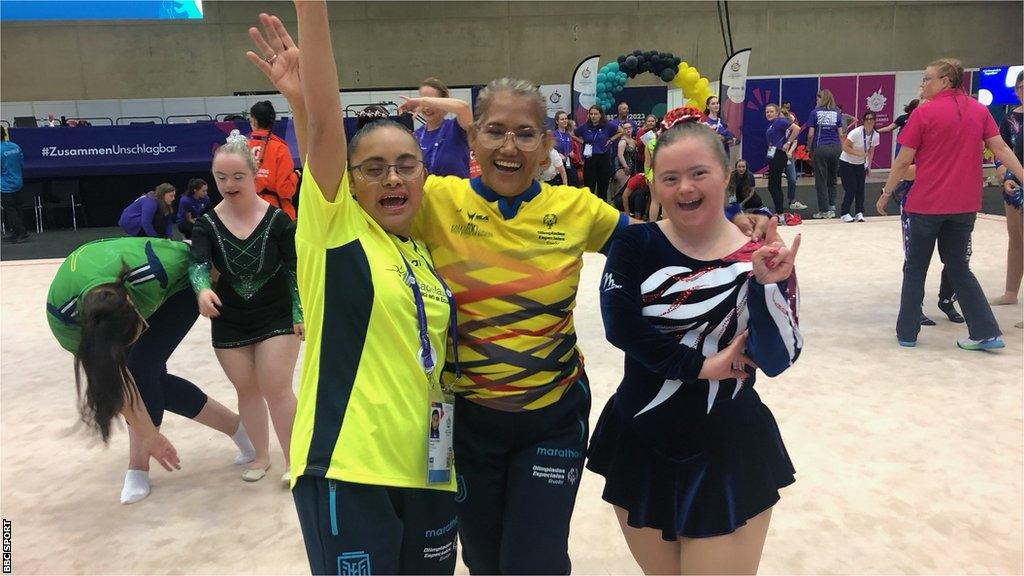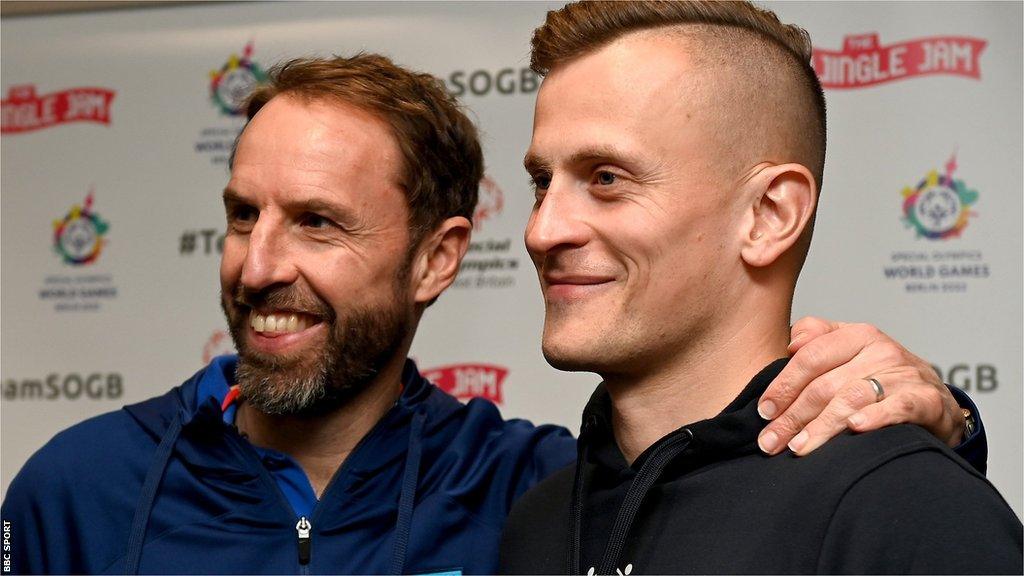Special Olympics: Why multi-sport event is about much more than medals
- Published

Rhythmic gymnast Ellie-Bea Thomas (right) joined competitors, coaches and officials in a dance routine
The proud claim of the Special Olympics World Summer Games is that it is the biggest sporting event in the world this year.
The evidence lies in the 7,000 competitors from nearly 200 countries who are taking part in 26 sports this week in Berlin, Germany.
As a huge multi-sport event, spread across venues in one the world's most prominent cities, the Special Olympics resembles the other members of the Olympic family - but it has a unique approach to sport. Every competitor here has an intellectual disability. They will give everything to win. But there is a deeper and broader sense of success.
Tim Shriver, the chairman of the global Special Olympics movement, said: "We reward people for doing their best. We don't ask the question, 'who is the best?' - we ask, 'what is your best?'. And that's a question everybody can answer."
That philosophy creates an atmosphere of competition and opportunity.
Ellie-Bea Thomas, from Northampton, is representing Great Britain in gymnastics. It's her first Special Olympics.
"I was a bit nervous at first," she told BBC Sport. "But I think I'm ready for it now. Gymnastics, it's amazing. I started when I was seven years old. You can just express any emotion through every single routine, it's amazing."
The initial stage of the Special Olympics involves a process called 'divisioning'. Each participant is watched by officials to assess their level of ability. Then they are placed in an event competing with others of a similar standard. Each event awards medals. Each event is valued the same.
I watched the divisioning stage of Thomas' rhythmic gymnastics competition. There were participants from Uzbekistan, Suriname, United Arab Emirates, Ecuador and a dozen other nations. Each of them executed the routine they'd practised for months, utterly focused on doing it perfectly and disappointed when minor mistakes occurred. That's exactly what you'd see in any sporting competition.
But when this session ended, they filled the floor to do a dance routine together. Some of the officials and many of the coaches joined in. This is a place for people with intellectual disabilities to be seen and to be celebrated.
"There remain walls in the world for people with intellectual disability," Shriver added. "Many of those walls you cannot see. They are the walls that are created by fear, by misunderstanding, by presumptions of disvalue. We're here to announce to the world. Not just the physical wall in Berlin came down - Berlin is now challenging the world to bring down the invisible walls that divide us from welcoming each other."
Special Olympian's 'wonderful' football stadium art in prestigious exhibition
Niall Guite, from Sheffield, is one Special Olympian who has spent the past few years smashing down walls. During the Covid-19 pandemic, when it became impossible to play sport, he started to draw it.
His stadium art has become so successful it was displayed at the Royal Academy in London. He's started a business selling the pictures and has even spoken publicly about his life, even though he acknowledges that speaking is his biggest challenge. In Berlin he is part of Britain's cycling team, having trained extensively on the road, on the track and in a spare bedroom.
"I feel honoured to be here," he told BBC Sport. "It feels electrifying but also tiring. The people have been superb. People have been really friendly and excited to meet you. It's brilliant. My life is fun now and I have friends and I get to be an artist and a cyclist and it's amazing."
Inclusion is a vital part of the Special Olympics movement. That's why mainstream sportspeople take part in some of the events, in Special Olympics terminology, 'unified partners'. They are expected to have a similar level of sporting ability to the players with intellectual disabilities.
Great Britain has a team in the unified football competition in Berlin. Before they left for the Games, I watched them train in a special session organised by the League Managers Association at the Football Association's St George's Park.

England manager Gareth Southgate with Jack Venturini, an intellectual disability player in Great Britain's unified football team
England manager Gareth Southgate was a keen observer and told me: "The idea that we all gain from mixing and learning from each other I think is really rich. I can see the excitement in the team and also the challenge. How can we work together? How do we find ways of working together? I think that will go way beyond what happens for them with the team and into their everyday lives."
Jack Venturini from Essex is one of the intellectual disability players in the team. An excellent communicator on the pitch, he described the experience of being in Berlin after the extravagant and colourful opening ceremony in the Olympic Stadium.
"It was the best experience ever, there's so many different countries here," he said. "It's an honour to represent my country. It's just amazing being here. I'm meeting new friends, experiencing new cultures. I'm really enjoying it. It's made me a more confident person, more relaxed and more happy."
That's the life-changing reward of the Special Olympics.

How did Messi win the World Cup with Argentina? Captivating interviews reveal what happened behind the scenes in Qatar
Can you crack the code to open the safe? Put your code-breaking skills to the test in this brainteaser
